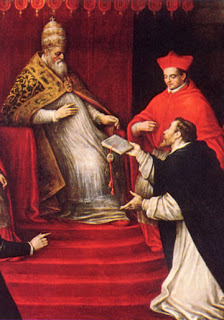Phenomenology of the Vows: Obedience
May 16, 2013
 |
| Professor Edmund Husserl |
*see also:
As Virgil and Beatrice were to Dante, so Edmund Husserl has been our guide to the three evangelical counsels. We have seen how his notions of intentionality and givenness enrich our understanding of what the vows offer to us and how we relate to them. Along the way we have also discovered other parts of Husserl’s philosophical project, such as the phenomenological reduction and the process of transcendental bracketing—the removal of all that is contingent and inessential in search of what is true. It is finally time to turn to obedience, the counsel according to the Dominican Constitutions that is pre-eminent among the counsels:
“By obedience a person dedicates himself totally to God and his actions come closer to the goal of profession, which is the perfection of charity. Everything else too in the apostolic life is included under obedience (LCO 19.1).”
“No conceivable theory can make us err with respect to the principle of all principles: that ever originally preventive intuition is a legitimizing source of cognition, that everything originally offered to us in ‘intuition’ is to be accepted simply as what it is presented as being, but also only within the limits in which it is presented there (Ideas I, section 24).”
“I have a particular intuition of redness, or rather several such intuitions. I stick strictly to the pure immanence; I am careful to perform the phenomenological reduction. I snip away any further significance of redness, any way in which it may be viewed as something transcendent, e.g., as the redness of a piece of blotting paper on my table, etc. And no I grasp in pure ‘seeing’ the meaning of the concept of redness in general, redness in specie, the universal ‘seen’ as identicalin this and that. No longer is it the particular as such which is referred to, not this or that red thing, but redness in general (The Idea of Phenomenology, 44-45).
“The more one does that is good, the freer one becomes. There is no true freedom except in the service of what is good and just. The choice to disobey and do evil is an abuse of freedom and leads to ‘the slavery of sin (CCC 1733).’”
“Because obedience ‘plants the roots of self-discipline in our hearts’ it is of the greatest benefit to that freedom of spirit characteristic of the children of God, and disposes us to self-giving charity (LCO 19.3).”
 |
| Pope Honorius III and St. Dominic – L. da Ponte |
“Through obedience, we imitate Christ in a special manner, Christ who always obeyed the Father, for the life of the world. We are thus more closely united to the Church, to whose building we are dedicated, for its common good and that of the Order (LCO 18.1).”
“Have this mind among yourselves, which is yours in Christ Jesus, who, though he was in the form of God, did not count equality with God a thing to be grasped, but emptied himself, taking the form of a servant, being born in the likeness of men. And being found in human form he humbled himself and became obedient unto death, even death on a cross (Philippians 2:5-8).”
For it is of the essence of this bliss to hold one’s dwelling in the divine Will, who makes our single wills the same, and His, So that, although we dwell from sill to sill throughout this kingdom, that is as we please, as it delights the King in whose desire We find our own. In His will is our peace: That is the sea whereto all creatures fare, Fashioned by Nature or the hand of God.
In God’s will is our peace, for obedience gives us Christ, and everything else along with him.



